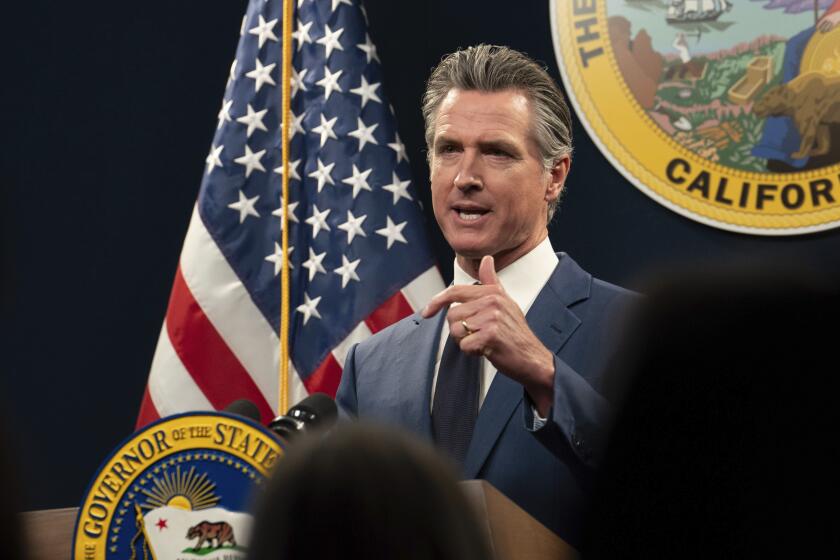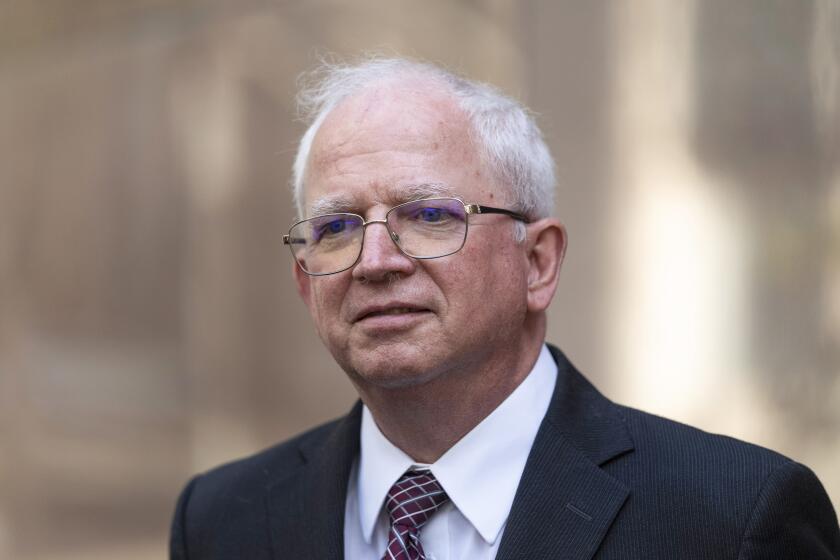Bishops’ Offer a Humanistic View
The National Conference of Catholic Bishops recently issued the third draft of its “Pastoral Letter on Catholic Social Teaching and the U.S. Economy.” There is no more appropriate time than this holiday season to reflect on the bishops’ views, particularly the teaching of the Scriptures to give a humanistic basis for economic analysis.
This is a time when we should be trying to “love our neighbors” in economic life, and the document provides masterly scholarship in showing how Judeo-Christian ethics can be interpreted in ways that point to a better, sounder and more just economy. At a time when we are shocked by news of enormous greed on Wall Street and of the Iran- contras scandal, it is comforting that the Catholic bishops have provided us with a refreshingly frank and fully believable statement about the American economy.
The third draft, like the two earlier versions, focuses on the distributional characteristics of the economy in contrast with overall macro concepts such as rate of growth, rate of inflation and magnitude of the twin deficits (internal and external). A principal message of the letter is that the least-favored groups in the U.S. distribution of wealth are not well served by our seemingly prosperous economy.
Interdependence Crucial
It is mainly a document about the American economy. But the bishops also note that the world is so economically interdependent that we cannot talk about the U.S. economy unless we consider conditions among our trading partners. A large portion of American exports, recently as much as 40%, goes to Third World nations, and the bishops are concerned about the poor position of developing countries in the world distribution of wealth and income. They say an economy performing well must deliver a good economic life to society’s least-favored groups and, in that respect, we cannot give good marks to the present system.
There is a fundamental difference between the humanistic approach of the American Catholic bishops and the objective approach of academic economists. The latter, especially those advising the present Administration, look to the “invisible hand” of the marketplace to settle major economic issues--the plight of the farmer, the fate of the unemployed, the delivery of public services or the burden of Third World debt.
In contrast, there is much warmth and human feeling in the pastoral letter:
- “The market is limited by fundamental human rights. Some things are never to be bought or sold.”
- “The Church’s teaching opposes collectivist and statist economic approaches. But it also rejects the notion that a free market automatically produces justice.”
- “Relief and prevention of . . . hunger cannot be left to the arithmetic of the marketplace.”
- “Competition alone will not do the job. It has too many negative consequences for family life, the economically vulnerable and the environment.”
Also, with respect to our tax system, the bishops emphasize the time-honored American principle of ability to pay, which is closely associated with the progressive nature of the system. In the recent debates about our newly reformed tax system, there was so much emphasis on simplicity and fairness (horizontal equity) that progressivity slipped into the background.
The bishops’ principal critique of our economic system, apart from the general observations about distributional inequities, is that there is too much unemployment, poverty in the midst of plenty, crowding out of civilian economic activities by defense spending, the elimination of the family farm, the skimpiness of American civilian aid for developing countries and the present preoccupation with takeovers, acquisitions and mergers in financial markets.
Ought to Do Better
A well-run economy--given our vast natural endowments--ought to be able to do better than provide jobs for only 93% of its work force, far distant from full employment. In this holiday season we are concerned about the homeless. It is a great shame that a rich country cannot provide them with food and shelter at a time when we have large agricultural surpluses and spend untold billions of dollars for armaments, many of which are being used for killing in far-off corners of the world. These are moral contradictions that cannot be worked out through the “magic of the market.”
Although the market might dictate the consolidation of many individually owned farms, a humanistic approach to rural sociology would seek to preserve the institution of the family farm.
Meanwhile, takeover mania generates violation of laws and codes of decent behavior and gives a false sense of values to the coming generation of managers, and it does nothing to improve American economic performance. Blind faith in deregulation and the pure law of the market is leading to poorer service in many lines of activity and oligopolistic concentration in others.
While the bishops have much to criticize in the American economy, it is only fair to say that their letter has its own deficiencies, which could be remedied in fourth or later drafts.
With respect to a very sensitive issue, their analysis does not take up demographic matters, particularly the contribution that population restraint could make to world economic progress.
Also, for the American economy, it is worth pointing out that the growth of the U.S. labor force has been quite strong in the recent past, aggravating the unemployment problem. We are now in a slower phase of labor force expansion, and this may help reduce the unemployment rate.
Finally, the treatment of U.S. agricultural exports and the role of foreign investment needs to be sharpened so as to give appropriate recognition to the mutual benefits from international capital flows and also to the fact that American agriculture is so productive that it must export its surplus.
These technical points aside, there is no doubt that the American Catholic bishops have done a fine job of careful scholarship in showing what is unsatisfactory about the functioning of the economy.
More to Read
Get the L.A. Times Politics newsletter
Deeply reported insights into legislation, politics and policy from Sacramento, Washington and beyond. In your inbox three times per week.
You may occasionally receive promotional content from the Los Angeles Times.






